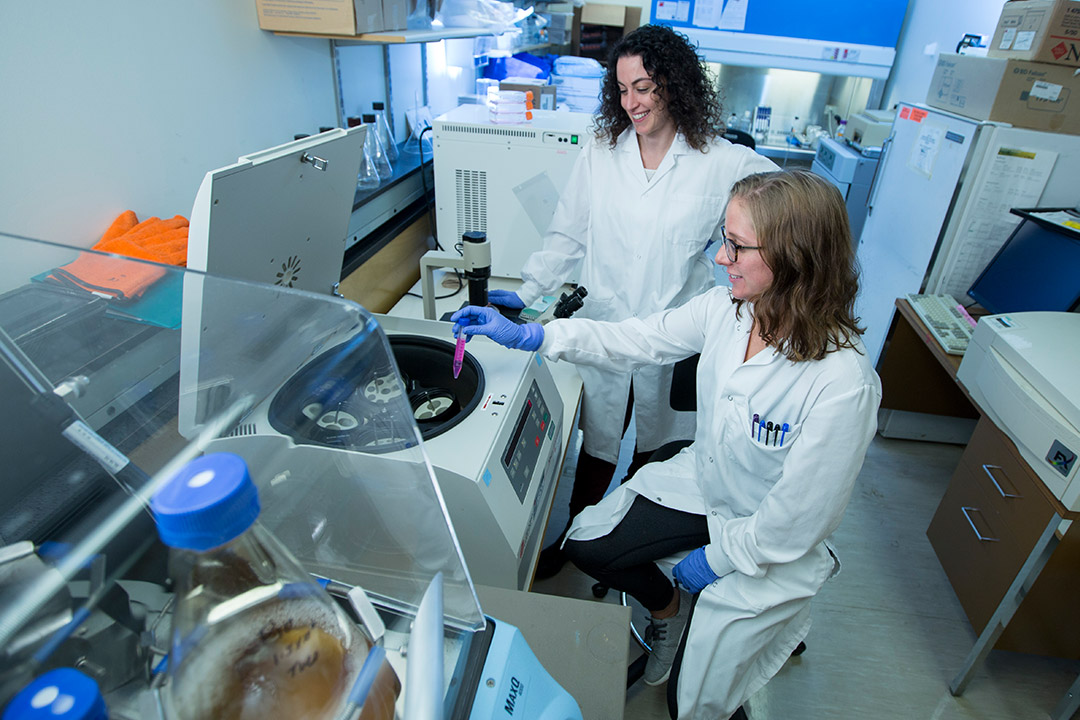
CFI awards USask researchers $1.3M for new tools to advance health, environment and the economy
SASKATOON — Eight University of Saskatchewan (USask) researchers have been awarded $1.3 million by the Canada Foundation for Innovation (CFI) for state-of-the-art equipment to support leading-edge projects in human health, food security, environmental protection, public safety and computer technology.
By USask Research Profile and Impact“This critical investment provides the cutting-edge tools our researchers need to advance a range of exciting and innovative projects that hold promise to improve the lives of Canadians,” said USask Vice-President Research Karen Chad. “These advanced tools will help our talented researchers become leaders in their fields as we work to address global challenges in areas such as food and water security.”
CFI’s John R. Evans Leaders Fund (JELF) awards were announced Aug. 12 in Edmonton by federal Science and Sport Minister Kirsty Duncan, and include the following USask recipients:
- Treating HIV: Linda Chelico, microbiologist in the College of Medicine ($213,000) aims to develop a new therapy for HIV (Human Immunodeficiency Virus), a virus that attacks the body’s immune system. Saskatchewan’s HIV infection rate is among Canada’s highest. Chelico’s grant is for high-resolution instrumentation essential for designing and selecting new compounds that enable human enzymes to alter the genetic information of HIV, rendering the virus incapable of replication.
- Restoring the environment: Matt Lindsay, geochemist in the College of Arts and Science ($125,000), aims to reduce the environmental impact and financial liability of oilsands mining. The CFI grant will fund a mine waste sample preparation and analysis suite that enables researchers to focus on the geochemistry and mineralogy of waste materials, providing data that will help restore land capability to pre-mining conditions.
- Conserving wildlife: Philip McLoughlin, biologist in the College of Arts and Science ($125,000), aims to improve northern wildlife surveying for conservation and food security. A new ultra-fine-resolution imaging system, coupled with USask expertise in advanced computing, will enable researchers to remotely collect timely and precise data on the species, location, number, and habitat of large mammals. The accurate data will help in formulating strategies for conserving wildlife that are a vital food source for northerners.
- Improving cryopreservation for organ transplantation: James Benson, a biologist in the College of Arts and Science ($162,000), is working on improving technology to safely freeze biological material (cryopreservation) over long periods at extremely cold temperatures, as a solution to the worldwide shortage of tissue and organs for transplantation. The equipment he acquires will provide critical experimental information on ice formation and chemical damage to cell-based models during freezing, helping to develop optimal cryopreservation protocols.
- Enhancing global food security: Byung-Kook (Brian) Ham, a biologist in the College of Arts and Science ($225,000), is researching ways to enhance global food security and Canadian agriculture through breeding crop plants that are better at acquiring mineral nutrients and using them more efficiently at times of environmental stress. A confocal microscopy platform will provide high-resolution live imaging of cells in plant vascular systems, enabling him to analyze molecular signalling between roots and shoots about nutrient demands. Ham holds the Research Chair in Plant Molecular Signalling, Root-Soil-Microbial Interactions at USask’s Global Institute for Food Security.
- Making roads safer: Alexander Crizzle, School of Public Health (158,000): Making Canada’s roadways safer and saving the health-care system millions annually is the goal of Crizzle’s project, which will establish Canada’s first cutting-edge research facility for assessing and rehabilitating high-risk drivers. Two driving simulators (a car and a truck) will be used to assess at-risk drivers, develop evidence-based protocols, and create novel interventions that improve their driving performance. The project will also test novel vehicle technologies including design elements and new software such as crash-avoidance systems.
- Managing toxicological risks: Markus Brinkmann, School of Environment and Sustainability and a faculty member with the USask Global Water Futures program ($114,000): With rapidly changing environmental conditions greatly affecting the processes that move contaminants through aquatic systems, Brinkmann’s goal is to understand and manage the toxicological risks to aquatic organisms, and ultimately humans, on a river basin scale. The award will fund instruments to quantify concentrations of contaminants in the environment and study their uptake and spread within aquatic organisms, including the processes that actively transport and biologically transform contaminants within their bodies.
- Improving computer chip technology: Li Chen, College of Engineering ($177,000), aims to improve the reliability of silicon chip technology devices such as computer microprocessors, implanted medical devices, and aerospace instruments, which frequently have errors induced by high-energy particles from space. His lab is acquiring a pulsed laser system that can effectively simulate radiation effects by injecting faults into integrated circuits, contributing to effective testing of mitigation measures undertaken in designing equipment.
CFI’s JELF awards fund up to 40 per cent of a project’s total cost. Researchers also rely on support from provincial governments, universities, and in-kind support from vendors for the equipment.
—30—
Jennifer Thoma
USask Media Relations
306-966-1851
jennifer.thoma@usask.ca
Article re-posted on .
View original article.
